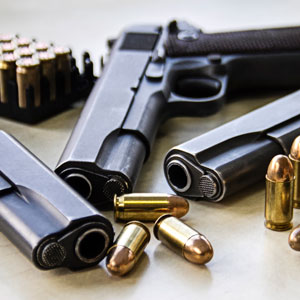The BMA GP Committee has changed its stance on GP firearm checks, removing its advice that GPs should not flag the records of patients with firearms.
The GPC guidance previously said ‘we do not recommend flagging notes’, but now says ‘the BMA supports the principle of flagging’, before outlining various issues with the ‘imprecise nature of flags’.
GPs called the change in stance a ‘cowardly flip-flop’ and said the flagging system is just a way of making up for the chronic underfunding of the police.
The BMA said the ‘clarifications’ come after talks with the police and Home Office, and it is still working towards securing a ‘standardised process’ which keeps the public and doctors safe.
GPs have been involved in the firearms application process since 2016, when they were asked to place a ‘firearm reminder’ code in the records of all patients who have a gun and inform police whether those were at risk of developing a mental health issue.
At the time the BMA’s guidance was vague when it came to GPs being allowed to charge for the service, but they later advised GPs to reject all requests from the police due to a lack of funding.
But in a new letter seen by Pulse, the GPC said following QC input on its firearm guidelines, this has changed.
The letter said: ‘While the BMA supports the principle of flagging in this way and reminds doctors of their duty of care to the public to raise concerns where they are apparent, we must also make doctors aware that due to the imprecise nature of flags, the lack of clear protocols for their appropriate removal and the absence of reliable software to facilitate the surveillance and cross-referencing of flags with diagnoses of concern, that we continue to have concerns about the flagging process and will continue to work with the Home Office to resolve this pressing question.’
This is a change from the previous guidance, which said: ‘While reminding doctors of their duty of care to the public to raise concerns where they are apparent, we do not recommend flagging notes in this manner.’
The letter also updated the advice on conscientious objection, saying that while conscientious objectors are still ‘not required to arrange for alternative provision of such a report’, in cases where a firearms licence is required for work – for example gamekeepers and farmers – GPs are encouraged to ‘assist applicants in identifying a suitable colleague willing to engage in the firearms certification process’.
According to the memo, the GPC has been meeting with the Home Office and policing minister Nick Hurd MP over the past few weeks, and talks are ongoing.
But Dr Nicholas Grundy, chair of campaign group GP Survival, said: ‘The flags only exist in an attempt to push some responsibility for monitoring gun ownership onto GPs.
‘They are different from the one-off “does this person have any medical conditions which could make gun ownership unsuitable”, in that they add a layer of medicolegal complexity to any consultation in someone who is a gun owner: does this consultation mean that if they go away and kill someone, I could be found negligent?
‘No one, least of all the BMA, can pretend that is what doctors are there for. This is a rather cowardly flip-flop on their part, whereby GPs are being asked to make up for – in my view – the chronic underfunding of the police who should be given the necessary funding to ensure guns are owned safely.’
GPC deputy chair Dr Mark Sanford-Wood said: ‘These clarifications are the result of ongoing dialogue with the police, Home Office and other stakeholders.
‘We continue towards our aim of a single, standardised process to ensure public safety and keep doctors safe. In our view there can be no half measures when it comes to the licensing of weapons that can be used with lethal outcomes.’
Changes in full
The guidance on flagging is changing from:
While reminding doctors of their duty of care to the public to raise concerns where they are apparent, we do not recommend flagging notes in this manner, due to the imprecise nature of flags, the lack of clear protocols for their appropriate removal and the absence of reliable software to facilitate the surveillance and cross-referencing of flags with diagnoses of concern. We continue to work with the Home Office to resolve this pressing question
to
While the BMA supports the principle of flagging in this way and reminds doctors of their duty of care to the public to raise concerns where they are apparent, we must also make doctors aware that due to the imprecise nature of flags, the lack of clear protocols for their appropriate removal and the absence of reliable software to facilitate the surveillance and cross-referencing of flags with diagnoses of concern, that we continue to have concerns about the flagging process and will continue to work with the Home Office to resolve this pressing question
The guidance on Conscientious Objection is changing from:
In our view conscientious objectors are not required to arrange for alternative provision of such a report (which may itself conflict with their ethical stance), although they may choose to do so
to
In our view conscientious objectors are not required to arrange for alternative provision of such a report. Where access to a firearm is a professional requirement – such as for gamekeepers and farmers – we would nonetheless encourage doctors to assist applicants in identifying a suitable colleague willing to engage in the firearms certification process.
Source: BMA

















